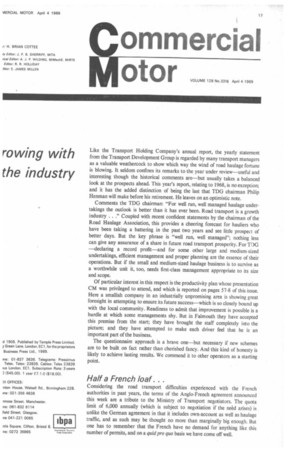rowing with the industry
Page 19

If you've noticed an error in this article please click here to report it so we can fix it.
Like the Transport Holding Company's annual report, the yearly statement from the Transport Development Group is regarded by many transport managers as a valuable weathercock to show which way the wind of road haulage fortune is blowing. It seldom confines its remarks to the year under review—useful and interesting though the historical comments are—but usually takes a balanced look at the prospects ahead. This year's report, relating to 1968, is no exception; and it has the added distinction of being the last that TDG chairman Philip Hemnan will make before his retirement. He leaves on an optimistic note.
Comments the TDG chairman: "For well run, well managed haulage undertakings the outlook is better than it has ever been. Road transport is a growth industry . . ." Coupled with recent confident statements by the chairman of the Road Haulage Association, this provides a cheering forecast for hauliers who have been taking a battering in the past two years and see little prospect of better days. But the key phrase is "well run, well managed"; nothing less can give any assurance of a share in future road transport prosperity. For TDG —declaring a record profit—and for some other large and medium-sized undertakings, efficient management and proper planning are the essence of their operations. But if the small and medium-sized haulage business is to survive as a worthwhile unit it, too, needs first-class management appropriate to its size and scope.
Of particular interest in this respect is the productivity plan whose presentation CM was privileged to attend, and which is reported on pages 57-8 of this issue.
Here a smallish company in an industrially unpromising area is showing great foresight in attempting to ensure its future success—which is so closely bound up with the local community. Readiness to admit that improvement is possible is a hurdle at which some managements shy. But in Falmouth they have accepted this premise from the start; they have brought the staff completely into the picture; and they have attempted to make each driver feel that he is an important part of the business.
The questionnaire approach is a brave one—but necessary if new schemes are to be built on fact rather than cherished fancy. And this kind of honesty is likely to achieve lasting results. We commend it to other operators as a starting point.
Haifa French loaf. . .
Considering the road transport difficulties experienced with the French authorities in past years, the terms of the Anglo-French agreement announced this week are a tribute to the Ministry of Transport negotiators. The quota limit of 6,000 annually (which is subject to negotiation if the need arises) is unlike the German agreement in that it includes own-account as well as haulage traffic, and as such may be thought no more than marginally big enough. But one has to remember that the French have no demand for anything like this number of permits, and on a quid pro quo basis we have come off well.










































































































